-
ORIGINAL ARTICLE
Validity study of the Three-Dimensional Work Fatigue Inventory among higher education nursing faculty
Revista Brasileira de Enfermagem. 2023;76(4):e20230020
10-09-2023
Abstract
ORIGINAL ARTICLEValidity study of the Three-Dimensional Work Fatigue Inventory among higher education nursing faculty
Revista Brasileira de Enfermagem. 2023;76(4):e20230020
10-09-2023DOI 10.1590/0034-7167-2023-0020
Views0See moreABSTRACT
Objective:
to adapt and validate the Three-Dimensional Work Fatigue Inventory (3D-WFI) for Brazil’s cultural reality and assess the psychometric properties.
Methods:
a methodological study developed in six stages: initial translation; synthesis of translations; back translation; review by expert committee; pretest; and review of the adaptation process by the researchers. For validity, the instrument was applied to a sample of 318 nursing professors from Brazilian federal and state public universities. Data were analyzed using exploratory and confirmatory factor analysis, composite reliability and instrument reliability (Cronbach’s alpha and McDonald’s omega).
Results:
the 3D-WFI instrument showed excellent internal consistency (α=0.95 and ω=0.97), three dimensions and explained variance of 62.77%.
Conclusions:
the Brazilian version of the instrument showed excellent psychometric properties for assessing fatigue among Brazilian workers.
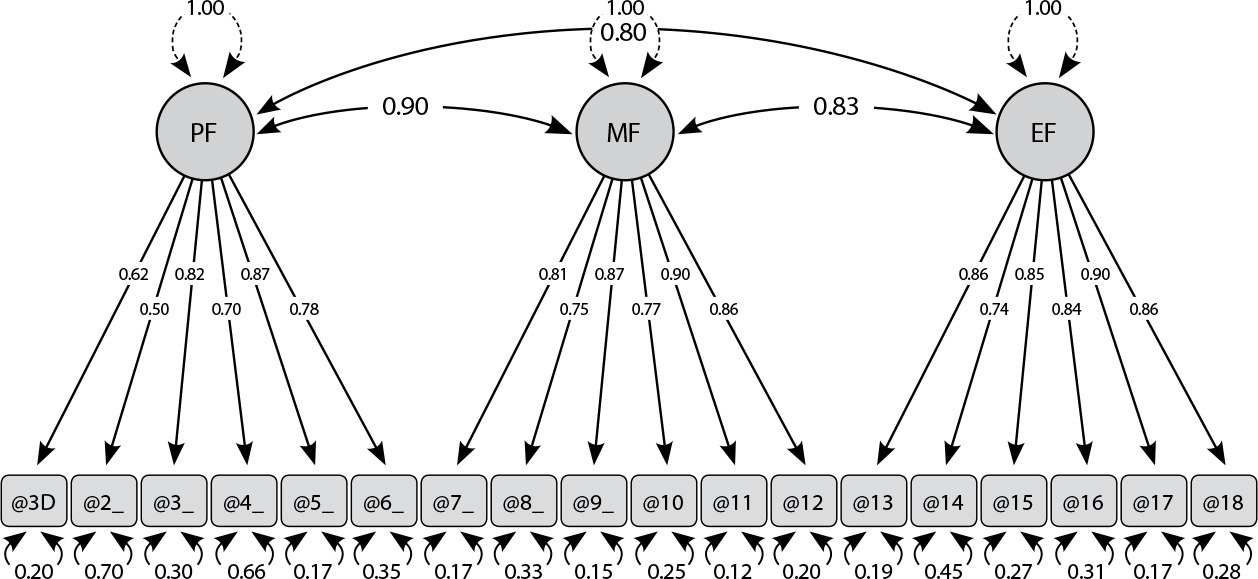
-
ORIGINAL ARTICLE
Glycemic variability and mortality in oncologic intensive care units
Revista Brasileira de Enfermagem. 2023;76(4):e20220812
10-09-2023
Abstract
ORIGINAL ARTICLEGlycemic variability and mortality in oncologic intensive care units
Revista Brasileira de Enfermagem. 2023;76(4):e20220812
10-09-2023DOI 10.1590/0034-7167-2022-0812
Views0See moreABSTRACT
Objective:
This study aimed to investigate the association between glycemic variability and mortality in patients admitted to oncologic intensive care units.
Methods:
A retrospective cohort study was conducted using a convenience sample of 30 medical records of patients over 18 years of age of both sexes. Glycemic variability was measured using the standard deviation and general amplitude. Statistical analysis was performed using the receiver operating characteristic (ROC) curve and the area under the curve (AUC). The significance level (α) was set at 5% with a confidence interval (CI) of 95%.
Results:
The study included 14 male patients (46.67%) with a mean age of 60±15 years. A total of 1503 blood glucose samples were collected. The AUC analysis for the standard deviation did not show a statistically significant result (p=.966; 95% CI=[0.283, 0.726]). In contrast, the general amplitude had a statistically significant association with mortality (p=.049; 95% CI=[0.514, 0.916]).
Conclusions:
This study found that glycemic variability measured by the general amplitude was significantly associated with patient mortality in oncologic intensive care units. These findings suggest that monitoring glycemic variability may be an important factor in the management of critically ill patients in oncologic intensive care units.

-
ORIGINAL ARTICLE
Independent and combined effects of lifestyle behaviors on adolescent health-related quality of life
Revista Brasileira de Enfermagem. 2023;76(4):e20220780
10-09-2023
Abstract
ORIGINAL ARTICLEIndependent and combined effects of lifestyle behaviors on adolescent health-related quality of life
Revista Brasileira de Enfermagem. 2023;76(4):e20220780
10-09-2023DOI 10.1590/0034-7167-2022-0780
Views0See moreABSTRACT
Objective:
To investigate the independent and combined effects of lifestyle behaviors, including physical activity, sedentary behavior, sleep duration and food intake, in the health-related quality of life (HRQoL) of Brazilian adolescents.
Methods:
Cross-sectional school-based study, with the participation of 306 adolescents aged 14 to 18 years. A questionnaire was applied with structured questions to collect lifestyle behaviors data. Perception of the HRQoL was identified using the Kidscreen-27. The study used covariance analysis and linear regression models for statistical analysis.
Results:
Adolescents who reported ≤ 2 hours/day of screen-based sedentary behavior and sleep duration equivalent to 8-10 hours/night presented significantly higher HRQoL. Adolescents who reported joint adherence ≥ 3 healthy lifestyle behaviors demonstrated approximately two [OR=2.12] to three times [OR=3.04] more chance of presenting higher perceptions of HRQoL.
Conclusion:
Although healthy lifestyle behaviors had a positive independent effect on HRQoL, joint adherence to healthy behaviors enhances the cumulative effect.

-
ORIGINAL ARTICLE
Health care for people with tuberculosis/HIV co-infection from the multidisciplinary team’s perspective
Revista Brasileira de Enfermagem. 2023;76(4):e20220733
10-09-2023
Abstract
ORIGINAL ARTICLEHealth care for people with tuberculosis/HIV co-infection from the multidisciplinary team’s perspective
Revista Brasileira de Enfermagem. 2023;76(4):e20220733
10-09-2023DOI 10.1590/0034-7167-2022-0733
Views0See moreABSTRACT
Objective:
to know the multidisciplinary team’s perspective about the health care of people with tuberculosis and human immunodeficiency virus co-infection in relation to treatment.
Methods:
this is a descriptive-exploratory study, with a qualitative approach, carried out in a health care service in São Paulo, from May to June 2019. Semi-structured interviews were conducted with nine professionals from the multidisciplinary team. Data were processed through discourse analysis with the support of webQDA.
Results:
Two empirical categories emerged: Health care interfaces for people with tuberculosis and human immunodeficiency virus co-infection; Barriers and facilitators for health care for people with co-infection.
Final considerations:
the health-disease process in co-infection is mediated by conditions that positively or negatively interfere with treatment compliance. People’s health care goes beyond exclusively clinical assistance and requires the recognition of needs in a broad perspective.

-
ORIGINAL ARTICLE
Spirituality in the uncertainty of illness: the perspective of oncology patients
Revista Brasileira de Enfermagem. 2023;76(4):e20220712
10-09-2023
Abstract
ORIGINAL ARTICLESpirituality in the uncertainty of illness: the perspective of oncology patients
Revista Brasileira de Enfermagem. 2023;76(4):e20220712
10-09-2023DOI 10.1590/0034-7167-2022-0712
Views0See moreABSTRACT
Objective:
To analyze spirituality in the process of illness uncertainty in cancer patients.
Methods:
This is a qualitative study, in which Merle Mishel’s Theory of Uncertainty of Disease was used as a theoretical framework; and as a methodological reference, the stages of Bardin’s Content Analysis. As a technique for obtaining information, a semi-structured interview was used.
Results:
Spirituality in the uncertainty of the disease varies from patient to patient and acts in a unique way. They presented readaptation attitudes in their reports. The presence of spirituality in their lives acted as the main force mechanism to deal with the uncertainty of the disease, and this moment was called by Mishel “probabilistic thinking”.
Conclusion:
Patients demonstrated readaptation attitudes in their reports, and spirituality acted as the main mechanism of strength to deal with uncertainty in the disease

-
Standard Operating Procedure validity on intramuscular vaccine administration in adults: a methodological study
Revista Brasileira de Enfermagem. 2023;76(4):e20220692
10-09-2023
Abstract
Standard Operating Procedure validity on intramuscular vaccine administration in adults: a methodological study
Revista Brasileira de Enfermagem. 2023;76(4):e20220692
10-09-2023DOI 10.1590/0034-7167-2022-0692
Views0See moreABSTRACT
Objective:
to validate a Standard Operating Procedure on the intramuscular vaccine administration technique in adults using high frequency vibration associated with cryotherapy.
Methods:
a literature review on intramuscular vaccination practice using a vibration device associated with cryotherapy. Then, a form was created to validate the instrument, detailing the items that were assessed by judges following recommendations in the literature. Judges’ answers were assessed using the Content Validity Index, with items whose index was greater than or equal to 0.80 being validated.
Results:
twenty-five nurses participated in validity, identifying judges’ opinion regarding item relevance, clarity and accuracy. Judges validated the instrument, according to the values that remained between 0.88 and 1.0.
Conclusions:
the instrument developed and validated is a tool capable of guaranteeing safety and standardizing immunization practice in vaccine rooms.
-
REVIEW
Self-care guidelines for patients in the post-hematopoietic stem cell transplantation period: a scoping review
Revista Brasileira de Enfermagem. 2023;76(4):e20220383
10-09-2023
Abstract
REVIEWSelf-care guidelines for patients in the post-hematopoietic stem cell transplantation period: a scoping review
Revista Brasileira de Enfermagem. 2023;76(4):e20220383
10-09-2023DOI 10.1590/0034-7167-2022-0383
Views0ABSTRACT
Objective:
To map the evidence on self-care guidelines for patients in the post-hematopoietic stem cell transplantation (HSCT) period.
Method:
Scoping review supported by Joanna Briggs Institute recommendations, with searches conducted between March and April 2022 in national and international databases and repositories of theses and dissertations.
Results:
Of the 11 studies that composed the final sample, the guidelines had a social and personal aspect, as post-transplant patients need to follow numerous essential recommendations for the prevention of infections and complications for successful treatment and improved quality of life.
Conclusion:
Knowing the self-care guidelines that must be performed by post-HSCT patients is fundamental for the nursing team to provide the necessary information for care outside the controlled environment of the hospital, in addition to minimizing episodes of infection, death, and increasing the survival and quality of life of transplant recipients.
Keywords:Health EducationHematopoietic Stem Cell TransplantationNursing CarePatient Discharge SummariesSelf-CareSee more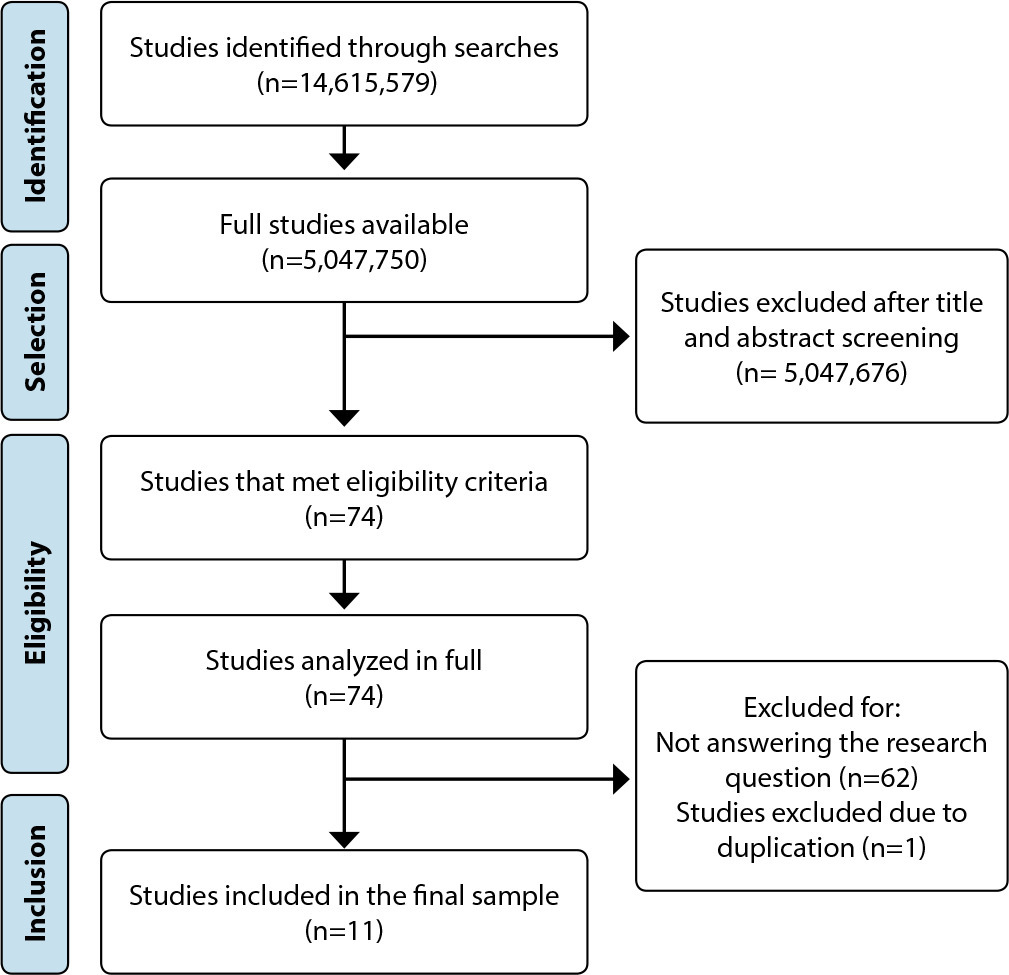
-
EXPERIENCE REPORT
Focus group in the development of concepts for a Nursing model: experience report
Revista Brasileira de Enfermagem. 2023;76(4):e20220689
10-09-2023
Abstract
EXPERIENCE REPORTFocus group in the development of concepts for a Nursing model: experience report
Revista Brasileira de Enfermagem. 2023;76(4):e20220689
10-09-2023DOI 10.1590/0034-7167-2022-0689
Views0See moreABSTRACT
Objective:
To communicate the experience of developing concepts for the construction of a care model through focus groups.
Methods:
An experience report on the development of concepts through remote focus groups with members of a research group from a public university in southern Brazil.
Results:
Focus groups were developed in which homogeneity and heterogeneity criteria were observed among participants. In addition to the concepts of the nursing metaparadigm, the concepts of care and family-centered care were developed, relevant to the nursing care model in question.
Final considerations:
Despite the challenges of conducting remote focus groups, they were suitable for the collective construction of concepts for a nursing care model, allowing the interaction of participants from different locations.
-
ORIGINAL ARTICLE
Changes implemented in the work environment of nurses in the COVID-19 pandemic
Revista Brasileira de Enfermagem. 2022;75:e20201381
11-29-2022
Abstract
ORIGINAL ARTICLEChanges implemented in the work environment of nurses in the COVID-19 pandemic
Revista Brasileira de Enfermagem. 2022;75:e20201381
11-29-2022DOI 10.1590/0034-7167-2020-1381
Views0See moreABSTRACT
Objective:
to describe the changes implemented in the work environment of nurses in university hospitals considering the COVID-19 pandemic.
Methods:
this qualitative and descriptive research was developed from an online survey with 75 nurses from three Brazilian university hospitals. Data processing occurred through textual analysis with the aid of software IRAMUTEQ.
Results:
five semantic classes were obtained: Organization of units for exclusive care of patients with COVID-19; Adaptations in the use of personal protective equipment; Physical structure adaptation; Care flow institution; Increased number of beds and training courses. Final considerations: the results show the effort of healthcare and nursing professionals/managers in the development of structural adaptations and reorganizations of care processes, in the hospital context, to respond with quality and efficiency to the demands arising from the COVID-19 pandemic.
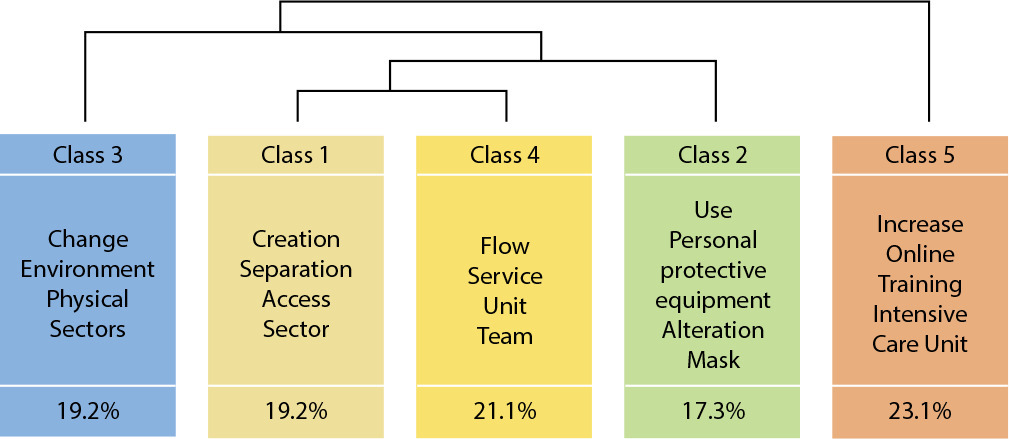
-
ORIGINAL ARTICLE
Permanent education for good practices in the prevention of pressure injury: almost-experiment
Revista Brasileira de Enfermagem. 2019;72(6):1646-1652
10-21-2019
Abstract
ORIGINAL ARTICLEPermanent education for good practices in the prevention of pressure injury: almost-experiment
Revista Brasileira de Enfermagem. 2019;72(6):1646-1652
10-21-2019DOI 10.1590/0034-7167-2018-0778
Views0See moreABSTRACT
Objective:
To verify the effectiveness of the educational intervention through the evaluation of nurses’ knowledge about prevention of pressure injury.
Method:
A quasi-experimental study with a single group, carried out with 95 nurses from a teaching hospital in the interior of Minas Gerais, in August and September 2017. As a teaching strategy, the active methodology and hybrid teaching were used, based on the reference of the Method of the Arch of Charles Maguerez. Data were collected from a validated instrument, called the Pieper Knowledge Test, and analyzed by descriptive statistics and Student’s t-test with significance level of p <0.001.
Results:
The mean number of correct answers obtained by the nurses was 78.8% in the pre-test and 88.8% in the post-test, and the difference was statistically significant (p <0.001).
Conclusion:
The educational intervention developed was effective, since it contributed to the improvement of nurses’ knowledge.

-
ORIGINAL ARTICLE
Nurse care for the hospitalized elderly’s spiritual dimension
Revista Brasileira de Enfermagem. 2019;72:236-242
12-05-2019
Abstract
ORIGINAL ARTICLENurse care for the hospitalized elderly’s spiritual dimension
Revista Brasileira de Enfermagem. 2019;72:236-242
12-05-2019DOI 10.1590/0034-7167-2018-0685
Views0See moreABSTRACT
Objective:
to analyze the nurse care for the spiritual hospitalized elderly’s dimension.
Method:
a qualitative study, based on Jean Watson’s Theory of Human Caring. The study included 17 nurses working in a geriatric center in Salvador City, Bahia State, Brazil. The collection of testimonies occurred between January and April of 2018, through an interview.
Results:
spiritual care were dialogue, encouragement and respect for religious activities, embracement, empathy. One of the obstacles to providing this care was the lack of preparation in accessing the elderly’s spiritual dimension.
Final considerations:
spirituality is a dimension of human and holistic nursing care. Caring for the spirit contributes to foster transpersonal care. The difficulty may be in the lack of nurses’ preparation. It is necessary that they cultivate and live their own spirituality, transmitting the understanding in each care relationship.
-
EXPERIENCE REPORT
Use of webQDA software on qualitative nursing research: an experience report
Revista Brasileira de Enfermagem. 2020;73(3):e20180411
04-03-2020
Abstract
EXPERIENCE REPORTUse of webQDA software on qualitative nursing research: an experience report
Revista Brasileira de Enfermagem. 2020;73(3):e20180411
04-03-2020DOI 10.1590/0034-7167-2018-0411
Views0See moreABSTRACT
Objectives:
to report the user experience of the webQDA software in the support of qualitative data analysis about health literacy of older adults.
Methods:
quasi-experimental research developed from January 2014 to January 2015, with 118 older adults, all of whom were interviewed to assess the level of health literacy. Interviews were carried out before and after four educational interventions, according to Freire’s method named Culture Circle. The interviews were transcribed and entered in the software, which highlighted the analytical categories.
Results:
the systems of sources, interpretative encoding and questioning of the data available in the software allowed the construction of three categories for the literacy levels and four categories for their dimensions.
Final considerations:
We concluded that the webQDA software enables the structured encoding of qualitative materials, ensuring faster and effective management of data with systematization and analytical transparency.

-
Concept analysis of Perioperative Thirst for the development of a new nursing diagnosis
Revista Brasileira de Enfermagem. 2021;74(1):e20200065
03-03-2021
Abstract
Concept analysis of Perioperative Thirst for the development of a new nursing diagnosis
Revista Brasileira de Enfermagem. 2021;74(1):e20200065
03-03-2021DOI 10.1590/0034-7167-2020-0065
Views0See moreABSTRACT
Objectives:
to analyze the perioperative thirst concept for the development of a new diagnostic structure according to NANDA International.
Methods:
a concept analysis study based on the framework proposed by Walker and Avant, instrumentalized through an integrative literature review based on SCOPUS, CINAHL, PUBMED, LILACS, and WOS. The elaboration of the diagnostic structure followed NANDA International guidelines.
Results:
41 studies were analyzed revealing that perioperative thirst is prevalent and intense, having visceral and behavioral attributes as the core of the concept. Antecedents indicate that surgical patients are vulnerable to thirst; and consequents 16 signs and symptoms were organized and model cases were developed. A diagnostic structure has been developed for perioperative thirst.
Final Considerations:
concept analysis allowed language standardization that describes thirsty patients, helping the identification, planning of actions and communication of perioperative nursing care.
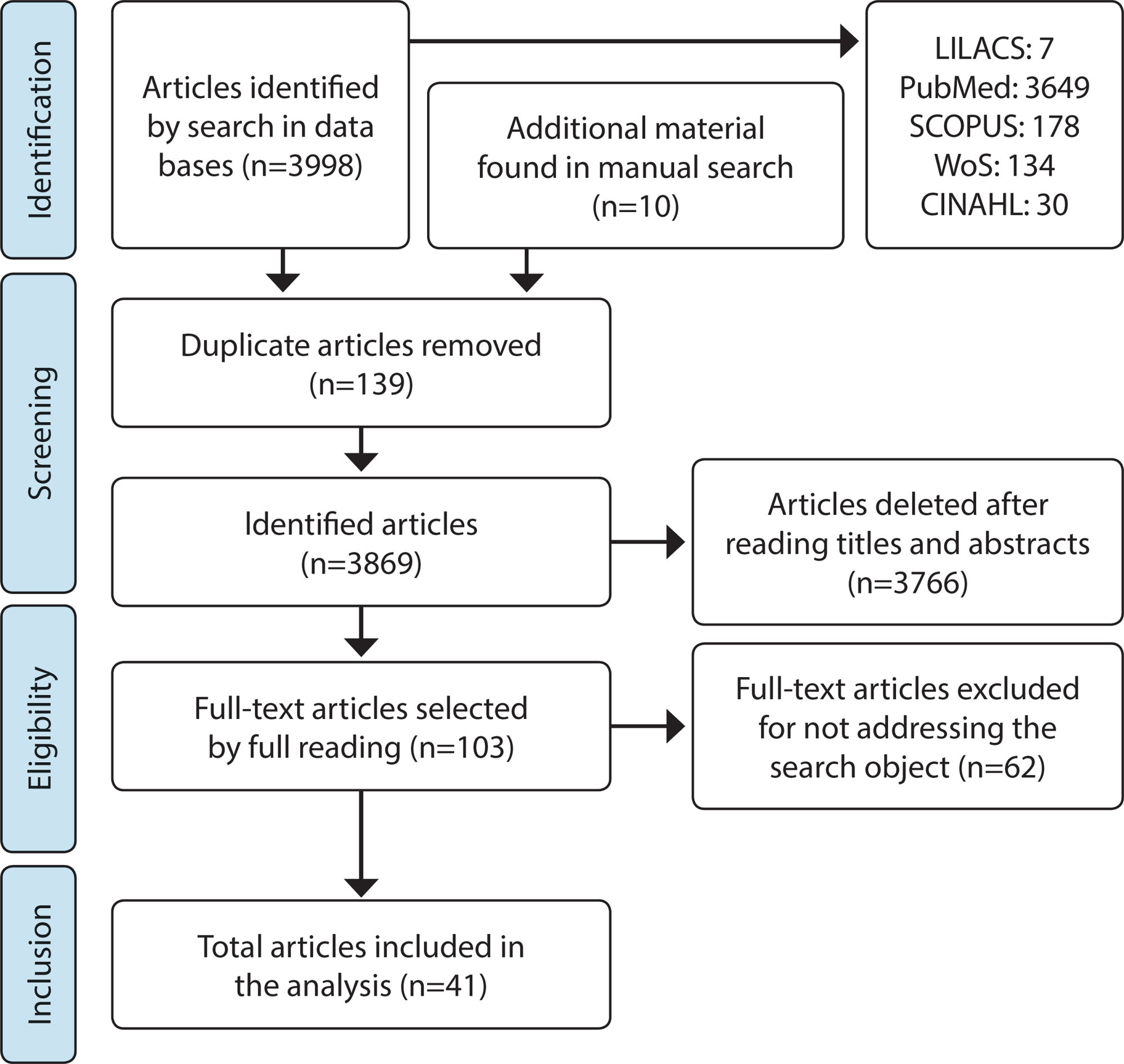
-
REFLECTION
Nursing Process in the Brazilian context: reflection on its concept and legislation
Revista Brasileira de Enfermagem. 2022;75(6):e20210898
05-11-2022
Abstract
REFLECTIONNursing Process in the Brazilian context: reflection on its concept and legislation
Revista Brasileira de Enfermagem. 2022;75(6):e20210898
05-11-2022DOI 10.1590/0034-7167-2021-0898
Views0ABSTRACT
Objectives:
to reflect on the global understanding of the Nursing Process concept, with emphasis on the Brazilian context.
Methods:
a reflection article, aligned with the vision and expertise of researchers who are members of the Nursing Process Research Network.
Results:
the reflection is presented in two main topics: The evolution of Systematization of Nursing Care X Nursing Process concepts and its consonance with national and international practices, and Brazilian legislation; The Nursing Process concept realignment in Brazilian legislation in line with current care, teaching and research practices. Final Considerations: the reflections were oriented to the Nursing Process’ conceptual, normative and legal issues, including elements of its historical evolution, and, with that, pointed to the need to modify the Brazilian regulation on the Nursing Process.
Keywords:Education, NursingLegislationNursingNursing CareNursing ProcessStandardized Nursing TerminologySee more -
ORIGINAL ARTICLE
Creation and validation of a visual educational technology content for lactation physiology learning
Revista Brasileira de Enfermagem. 2020;73(6):e20190564
09-07-2020
Abstract
ORIGINAL ARTICLECreation and validation of a visual educational technology content for lactation physiology learning
Revista Brasileira de Enfermagem. 2020;73(6):e20190564
09-07-2020DOI 10.1590/0034-7167-2019-0564
Views0ABSTRACT
Objective:
to create and validate a visual educational technology content for lactation physiology learning.
Method:
a methodological study that contemplated the stages of content creation and validation guided by the conceptual model of Knowledge Translation into action. The creation took place in partnership with the educational technology center of the project’s home institution. The validation was attended by 27 judges with experience in the obstetric, neonatal, pediatric or maternal and child areas and in the theme of breastfeeding.
Results:
an educational technology covered animation and video techniques to locate, respectively, elements of lactation physiology and the population involved. An Overall Content Validity Index of 0.84 was obtained.
Conclusion:
the visual educational technology for lactation physiology learning has been validated in content as a tool to introduce the theme and mediate health education actions that can have a positive impact on breastfeeding.
Keywords:Audiovisual ResourcesEducational TechnologyHealth EducationLactationTranslational Medical ResearchSee more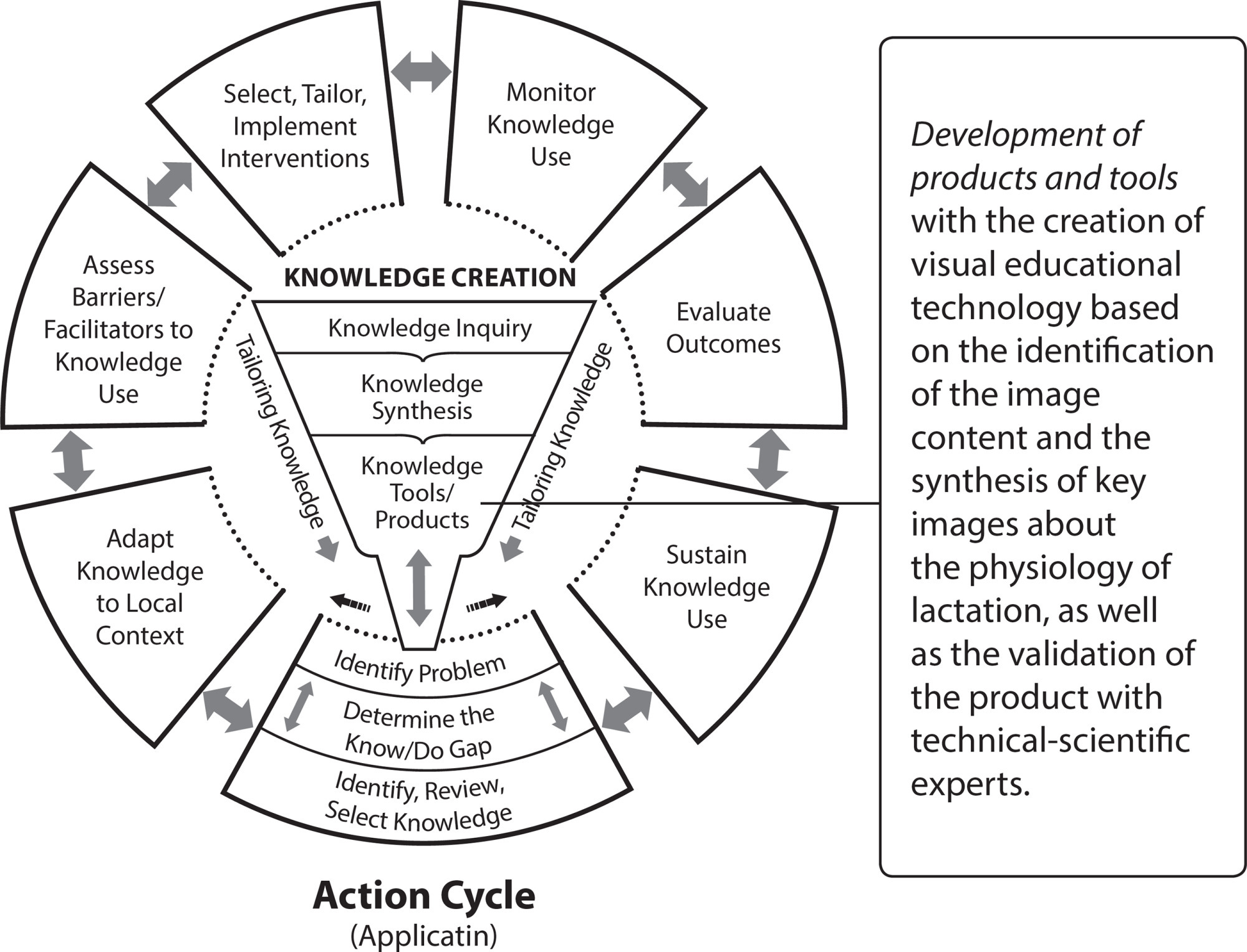
-
ORIGINAL ARTICLE
Risk of suicide among nursing students
Revista Brasileira de Enfermagem. 2021;74(6):e20200867
08-20-2021
Abstract
ORIGINAL ARTICLERisk of suicide among nursing students
Revista Brasileira de Enfermagem. 2021;74(6):e20200867
08-20-2021DOI 10.1590/0034-7167-2020-0867
Views0See moreABSTRACT
Objectives:
to identify the risk and degree of risk of suicide in nursing students of a public institution in the countryside of Pernambuco, Brazil.
Methods:
this was a cross-sectional, quantitative research conducted with 150 students. For data collection, a sociodemographic questionnaire and the instrument, M.I.N.I. – Brazilian version 5.0.0 – Module C – Risk of suicide were used. Statistical analyses were performed with IBM(® )SPSS(®), version 23.
Results:
53.3% of nursing students had a risk of suicide, of which 20.7% had a high risk. Moreover, 22.67% reported previous suicide attempt. It is noteworthy that students without a partner have a higher risk of suicide (56.8%) than those with a partner (29.4%).
Conclusions:
it is perceived the need to develop programs that identify students at risk of suicide in higher education institutions, in order to raise awareness of the problem and implement policies to promote mental health in the academia.
Search
Search in:
Nuvem de Tags
Aged (144) Atenção Primária à Saúde (239) COVID-19 (104) Cuidados de Enfermagem (269) Educação em Enfermagem (151) Educação em Saúde (139) Enfermagem (930) Estudos de Validação (131) Health Education (144) Idoso (208) Mental Health (149) Nursing (987) Nursing Care (306) Patient Safety (151) Primary Health Care (284) Qualidade de Vida (104) Quality of Life (106) Saúde Mental (145) Segurança do Paciente (150) Validation Studies (108)



